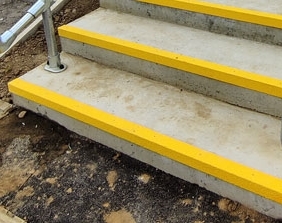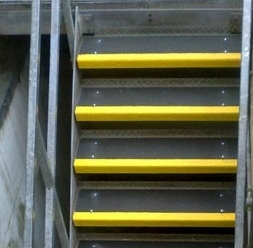GRP Stair Nosing – UK Antislip Compliance Guide for 2025
29th Jun 2025
GRP Stair Nosing UK: Ultimate Anti-Slip Fibreglass Stair Nosings Guide
Ensure stair safety in your UK property with GRP stair nosings (fibreglass stair tread covers). Ideal for industrial, commercial, or public buildings, these anti-slip stair edges are durable, weatherproof, and compliant with UK regulations like Part M and BS 8300. Discover sizes, installation tips, and maintenance best practices below.


What Is GRP Stair Nosing?
GRP stair nosing, also called fibreglass stair nosing or anti-slip stair edge, is a slip-resistant profile installed at the leading edge of steps. Made from fibreglass with a high-grip aggregate surface, it provides excellent anti-slip protection, even in wet or industrial environments.
Why Choose GRP Anti-Slip Stair Nosings?
- Slip Resistance: R11+ grip ensures safety in high-traffic areas
- Durable & Weatherproof: Resistant to water, oil, UV, and chemicals
- High Visibility: Yellow or white nosings comply with Part M
- Low Maintenance: No painting or coating needed
- Easy Installation: Pre-drilled or adhesive options for DIY or professional teams
GRP Stair Nosing vs Alternatives
| Material | Slip Resistance | Durability | Maintenance | Installation |
|---|---|---|---|---|
| GRP (Fibreglass) | Excellent (R11+) | 5–10 yrs | Low | Easy (DIY or pro) |
| Aluminium with Grit | Good | 3–5 yrs | Medium | Medium |
| Anti-Slip Tape | Fair | 6–12 months | High | Very Easy |
UK Regulations for Stair Nosing
- Building Regulations Part M: Minimum 30 LRV contrast for visibility
- BS 8300-2:2018: Accessibility standards for visually impaired users
- Equality Act 2010: Inclusive and safe stair design
- Health & Safety at Work Act 1974: Duty to reduce slips and trips
Read our Stair Nosing Regulations Guide (2025 Update)
Choosing the Right GRP Stair Nosing for UK Buildings
- Size/Profile: 55x55mm, 70x30mm, custom sizes
- Grit: Medium (1mm) outdoor/industrial, Fine (0.5mm) indoor
- Installation: Pre-drilled screw-fix or adhesive
- Colours: Yellow/white (high visibility), black/grey (subtle compliance)
Installation Guide
- Clean stair surface thoroughly
- Cut nosing to match step dimensions
- Apply adhesive or screw fix
- Ensure edges are flush and sealed if outdoors
Download full installation PDF
Case Study: Logistics Centre
A Midlands logistics hub installed 55mm yellow GRP nosings on exterior steel stairs:
- 80% reduction in slip incidents over 6 months
- Compliant with Part M and Equality Act
- Installation completed in under 2 hours
Care & Maintenance Tips
- Clean with mild detergent and warm water
- Avoid wire brushes or pressure washers
- Inspect quarterly for wear
FAQs About GRP Stair Nosings
- Can GRP nosing be used outdoors?
- Yes. UV-resistant, weatherproof, ideal for wet or icy steps.
- Do I need a professional installer?
- No. Any competent DIYer or maintenance team can install GRP nosings.
- How long does GRP stair nosing last?
- Typically 5–10 years depending on traffic and conditions.
- What is the best GRP anti-slip stair nosing for UK outdoor steps?
- Medium grit (1mm) fibreglass stair nosings in yellow or white for maximum visibility and slip resistance.
Conclusion
GRP stair nosing is essential for stair safety, compliance, and durability. Easy to install, low-maintenance, and anti-slip, it’s perfect for warehouses, schools, public buildings, and commercial sites.
Contact our team for trade pricing or custom sizes, or Shop GRP stair treads now.
